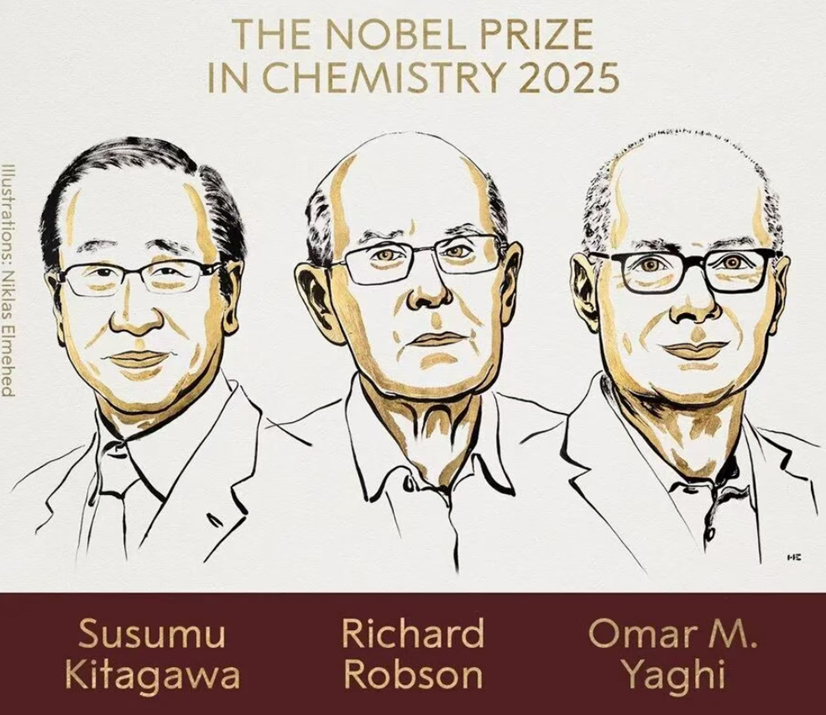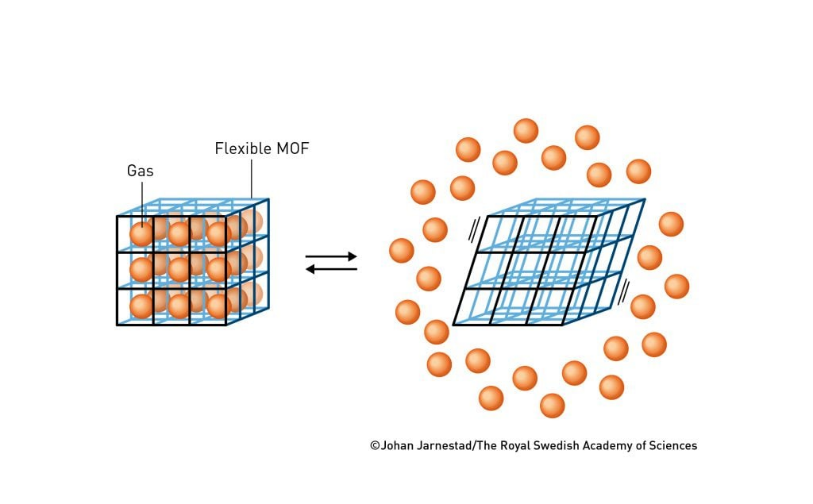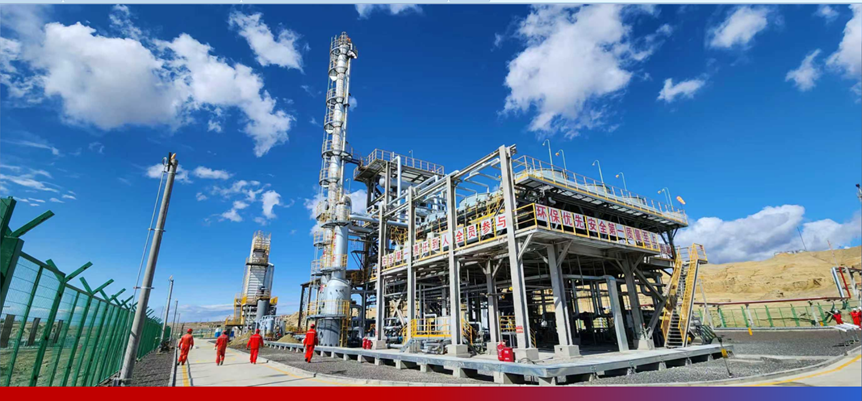The 2025 Nobel Prize in chemistry has been awarded to three scientists for their work on Metal–Organic Frameworks (MOFs), signaling that these materials, hailed as the “pivotal materials for the 21st century”, have entered the commercialization stage at an accelerated pace;
In 2023, the OGCI China Climate Investments (CCI) managed by China Oil and Gas Climate Investments (COGCI) made a strategic investment in Basemof (formerly referred to as BlueShell)—a leading domestic enterprise in the MOFs industry, thereby claiming the high ground in global CCUS technological innovation, accelerating the decarbonization of the oil and gas industry;
COGCI fully leverages its venture capital strengths of “making investments in early-stage companies, particularly small startups, with a long-term commitment, and in hard & core technologies”, digging deep into disruptive decarbonization technologies and actively engaging in international cooperation on addressing climate change.
On October 8, the Royal Swedish Academy of Sciences announced the 2025 Nobel Prize in chemistry, awarding it to three pioneers of Metal–Organic Frameworks (MOFs): Susumu Kitagawa of Japan, Richard Robson of the United Kingdom, and Omar M. Yaghi of the United States. This prestigious honor not only represents the highest recognition for their decades of dedication to research, but also signifies a global consensus within the scientific and industrial communities on the immense potential of MOFs.

Source: Official Nobel Prize Website
Metal–Organic Frameworks (MOFs) are crystalline porous materials formed through the self-assembly of metal ions (nodes) and organic molecules (linkers) via coordinate bonds. They are like Lego sets, but on the atomic scale. MOFs offer two key advantages: first, they possess exceptionally large specific surface areas and precisely tunable pores, enabling molecules to freely enter and exit the frameworks; second, they are programmable—functional materials tailored for specific applications can be created by selecting different metal nodes and organic linkers.

MOFs contain flexible molecular building blocks that can create a flexible material for gas separation (source: Royal Swedish Academy of Sciences)
At the 2025 Nobel Prize in Chemistry announcement ceremony, Heiner Linke, Chair of the Nobel Committee for Chemistry, noted that MOFs have “enormous potential”, bringing “previously unforeseen opportunities for custom-made materials with new functions”. This comment has captured the revolutionary significance of MOFs: for the first time, chemists can systematically design and construct three-dimensional porous networks with precisely targeted functions. MOFs have demonstrated transformative application potential in areas like carbon dioxide capture, gas separation and storage, water harvesting from air, and separation of rare and precious metals. Already making inroads into key scenarios of industry and daily life, MOFs are emerging as a “powerful weapon” in addressing global climate challenges.
On September 24, 2025, Chinese President Xi Jinping delivered video remarks at the United Nations Climate Summit. Xi pointed out that “this year marks the 10th anniversary of the Paris Agreement, a pivotal year for countries to submit their new Nationally Determined Contributions (NDCs), and global climate governance is entering a key stage”. Meanwhile, he announced China’s new NDCs: China will, by 2035, reduce economy-wide net greenhouse gas emissions by 7% to 10% from peak levels, striving to do better.
In 2015, CNPC joined the Oil and Gas Climate Initiative (OGCI). Bringing together 12 of the largest oil and gas companies worldwide to lead the industry’s response to climate change, the organization aims to accelerate action towards the carbon emissions reduction targets consistent with the Paris Agreement. In 2021, Chairman Dai Houliang of CNPC pointed out in an article published in the QIUSHI magazine that “We will further leverage our role as the only member enterprise from China in the OGCI, actively engaging in international cooperation on addressing climate change. We will join hands with other global energy companies to achieve the green and low-carbon transformation of the oil and gas industry”.
It was against this backdrop that CNPC, CI and Hainan Free Trade Zone Fund jointly established the OGCI China Climate Investments (CCI) in 2022. Guided by the goal of realizing GHG impact, CCI focuses on investing in innovative technologies and business models in greenhouse gas emissions reductions. As a strategic investment fund dedicated to the forefront of decarbonization, CCI has been actively seeking out leading climate technology companies in China since its inception. In early 2022, Basemof came onto CCI’s investment radar.
Faced with the MOFs technology which is still in its infancy, CCI’s investment team started with a first-principles thinking in science and technology, conducting in-depth research into the development progress, synthesis pathways and key technological bottlenecks of MOFs at domestic research institutions. Meanwhile, the team zeroed in on cost competitiveness—the defining challenge for the industrial application of MOFs, calculating costs in detail across each stage of the industrial chain and mapping out a technology cost learning curve. By analyzing and comparing cases of foreign investment institutions in the MOFs area, the team built a comprehensive investment evaluation model.
In the end, Basemof won the recognition of CCI by virtue of its independently developed MOFs synthesis technology with full intellectual property rights and the world’s first slurry-based gas separation process. In 2023, CCI completed the strategic investment in Basemof. After over two years of development, the company has built a hundred-ton-scale industrial MOFs synthesis facility which was recognized as the most efficient and environmentally friendly in the industry. This achievement has driven an one-order-of-magnitude reduction in MOFs production costs, removing a barrier to large-scale commercialization. The company has developed a series of MOFs with high adsorption capacity, excellent selectivity, and low desorption temperatures, enabling application in high-value scenarios like decarbonization of oilfield associated gas, natural gas-ethane separation, and carbon capture from medium-temperature shift gas from refinery hydrogen production. Furthermore, by adopting a slurry-based absorption-desorption process, Basemof relies on mature chemical equipment supply chains and intelligent operation technologies to significantly reduce both capital expenditure and operating expenses for gas separation facilities.
At the end of 2023, joining hands with Xinjiang Oilfield and Kunlun Trust, Basemof built China’s first MOFs-based carbon capture and utilization facility—Fengcheng Oilfield Operation Area’s Integrated Ultra-heavy Oil Extraction Associated Gas Utilization Project. As of the end of September 2025, the facility had treated a total of 32 million cubic meters of oilfield associated gas. By utilizing industrial waste heat of 65°C for gas desorption, it has realized the remarkable result of energy consumption of ≤1.0 GJ for per ton of CO₂ captured. During the operation of the Project, Basemof successfully overcame significant engineering challenges like complex gas compositions and high gas flow fluctuations, enabling safe and stable operation for more than 20 months and realizing high-efficiency carbon capture and methane recovery. With this milestone, Basemof’s MOFs-based carbon capture technology has claimed the high ground in CCUS technologies, forging a new path for the green and low-carbon development of the global oil and gas industry.

Fengcheng Oilfield Operation Area’s Integrated Ultra-heavy Oil Extraction Associated Gas Utilization Project, currently the world’s largest single-unit MOFs-based carbon capture project
In an interview at the beginning of this year, Professor Omar M. Yaghi mentioned that “A groundbreaking discovery in the lab is just the beginning; the real challenge lies in bridging the gap between scientific innovation and real-world application” and that “Demand drives innovation not just in product design but also in production efficiency, cost reduction, and scalability. What seems expensive and unattainable at first can become ubiquitous if enough people see value in it.”
By leveraging the industrial background advantages of the CCI, Basemof’s MOFs-based carbon capture technology is, on the basis of meeting the needs in CCUS development, entering a fast track of industrialization now.
COGCI, as the dedicated decarbonization technology investment institution, will fully leverage its venture capital strengths of “making investments in early-stage companies, particularly small startups, with a long-term commitment, and in hard & core technologies. As MOFs are recognized with the Nobel Prize, COGCI will continue to dig deep into disruptive decarbonization technologies and keep contributing to international cooperation on addressing climate change.
